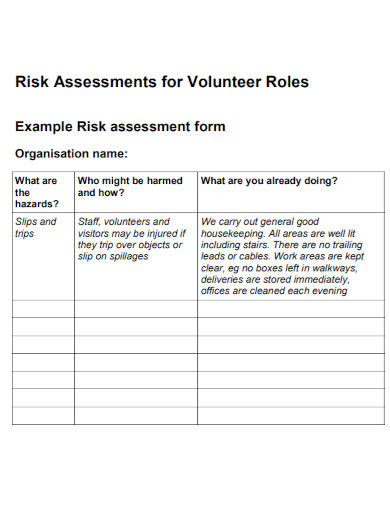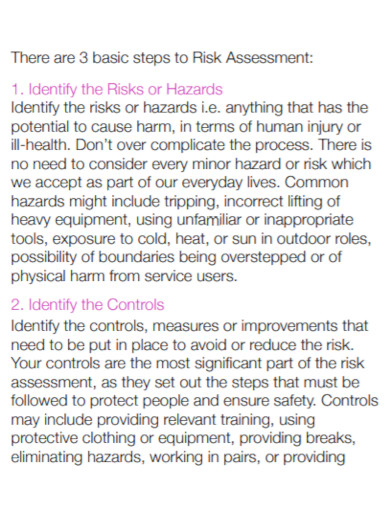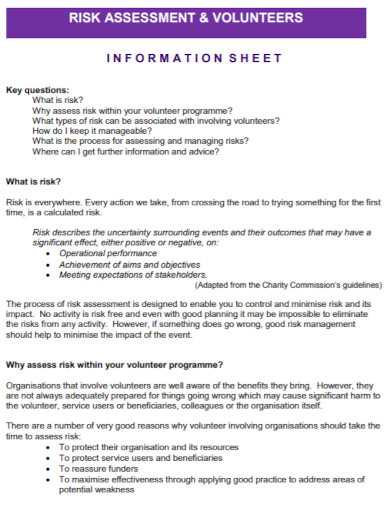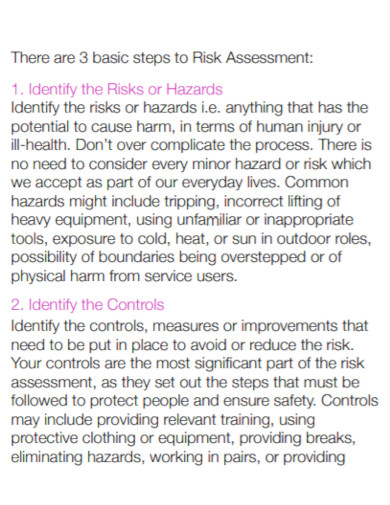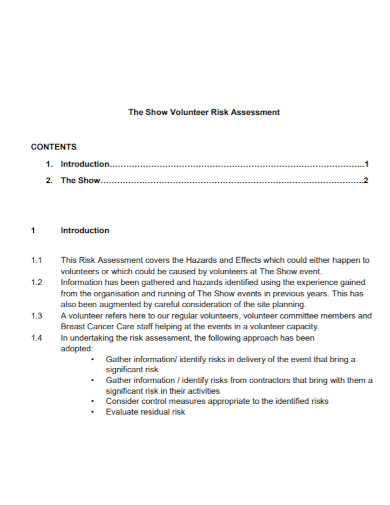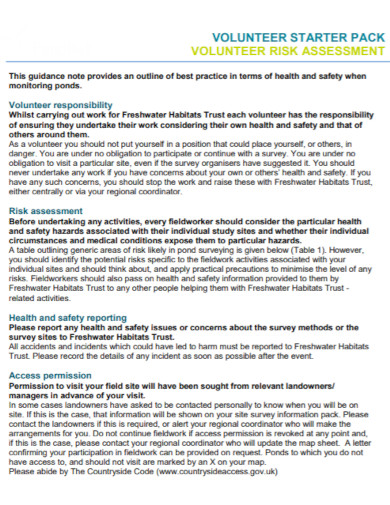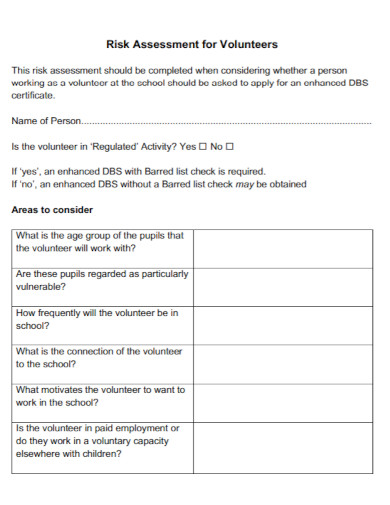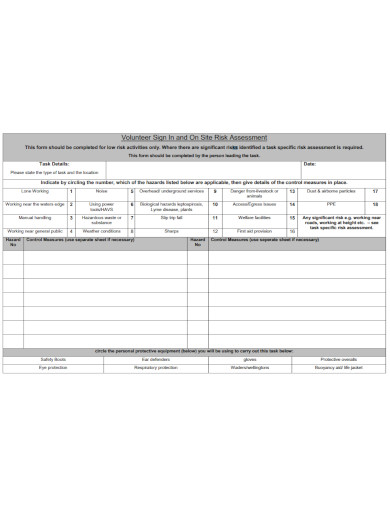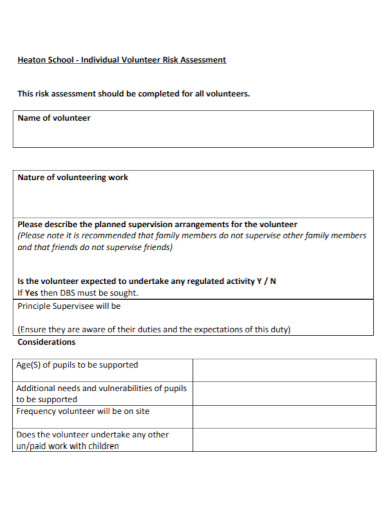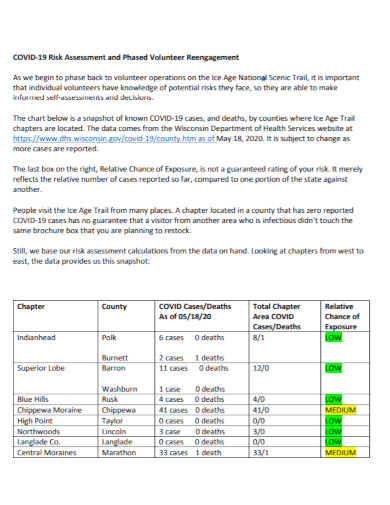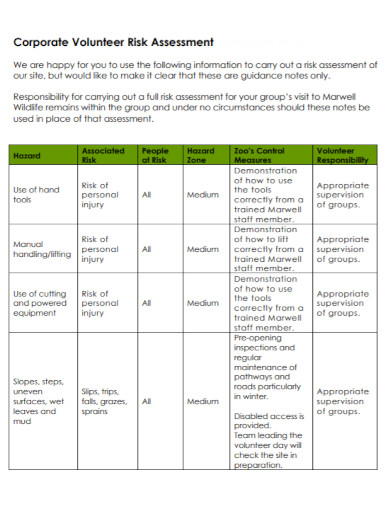8+ Veterinary Risk Assessment Examples to Download
Volunteering for events is fun. Giving your time, skills and talent to help out is such a nice feeling. Asking for people to help out is not always an easy feat. You have to take into consideration the risks that may be there. If you are that person who would rather take everything into account, by analyzing, gathering evidence and looking for ways to solve issues, this article may be just what you need. This article would discuss volunteer risk assessment and what to do when you encounter one in an event or workplace. Check it out now!
10+ Volunteer Risk Assessment Examples
1. Risk Assessments for Volunteer Template
2. Volunteer Role Risk Assessment
3. Volunteer Risk Assessment Information Sheet
4. Volunteer Activity Risk Assessment
5. The Show Volunteer Risk Assessment
6. Standard Volunteer Risk Assessment
7. Risk Assessment for Volunteers in PDF
8. Volunteer Sign In and On Site Risk Assessment
9. School Volunteer Risk Assessment
10. Volunteer Reengagement Risk Assessment
11. Corporate Volunteer Risk Assessment
Definition of Volunteer
A volunteer is an individual who offers their time, skills or talent by helping others. A person who does something willingly. To give your services without asking for something in return. Giving information without being asked. A person who volunteers their talent to benefit others. Without asking for any monetary gain or without asking for something back. In addition to that, a volunteer is a person who does work for others without being forced to do so.
Definition of Assessment
An assessment is a type of examination. Its role is to test a person’s or an object’s importance, value and quality. The act of testing, analyzing, evaluating something to see if it is still up to its task. In addition to that, an assessment is the act of judging by the results before making a decision. The process of understanding the information gathered. Through looking at the bigger picture before deciding on the action to be taken.
Definition of Risk Assessment
A risk assessment is the act of identifying potential hazards and risks that may be found around events, workplace or any other. This assessment is a process where risk factors and hazards are identified before anything can happen. To analyze, collect data and to evaluate potential and overall harm. In addition to that, it is to assess, to check and to see what level of risk it is. As well as to find a way to protect those who may be at risk of the hazard.
Importance of Risk Assessment
The importance of a risk assessment is to reduce the chance of any injuries that may occur in the workplace. To lessen the amount of casualties that are the result of underlying hazards. In addition to that, it is also to help create awareness to anyone who may be at risk of these issues. Employers, business owners, or even those who are assigned at events, are responsible for knowing and seeing where these hazards may be. As well as who may be affected and how to stop or lessen the problem that these cause.
Tools for Assessment
Moving on to some tools to use for assessment. Check out some of these tools that you may use for assessing risk issues in the workplace or anywhere at all.
- Fill Out Form – This type of assessment form from the name itself, means you have to give out specified information. These information are used to assess and for collecting of data to use to complete the risk assessment. Fill out forms are most likely to be the most common assessment tool used.
- Essay – There are some assessments that are in the form of an essay. Not only is it easier and simpler to write, it is also easier to highlight the information you have gathered. Essays are usually the ones being used, after the fill out forms. But they all have the same purpose. They are used as assessment tools.
- Diagram – Diagrams are used when you want to compare previous data to the current data gathered. There are some diagrams you can use for assessment that would not only look easier, but also be made into chronological order.
- Outline – Just like essays, outlines are just one of the most common tools to use for an assessment. It gives you detailed information about the hazard problem. It also breaks down general to specific information to make it easier. Outlines are also a common tool for assessment.
- Questionnaires – Questionnaires are only used when the gathered information is lacking. This type of assessment tool usually works with essay types.
- Checklist – Checklist assessment tools are also as useful as the rest of the tools mentioned. This type of tool helps you see through checking all that is true about the issue. Checklists are usually used when you are gathering data from people around you, especially those who may be of risk.
Tips for Assessment
Here are some tips when you are about to do an assessment. These tips are simply guidelines for you to understand or follow. But how you do your assessment is clearly up to you. Now let’s get right to it:
- Search and identify any object that may cause harm
- Analyze and decide who are the affected persons
- Collect data and assess the risks
- Take action once you have the results
- Record all your findings for future references
- Review your assessment results
FAQs
Who can I hold responsible for taking action for the risk assessment?
The people you can assign for the risk assessment and to take action, are the people who are well equipped with dealing with these kinds of situations. Do not take action if you have no idea what you are dealing with. As this will cause you more harm than good.
Is there a way for me to know the result of the assessment?
Yes. You may ask the person in charge of the assessment. If you are the one doing the assessment, you can keep a copy for future references.
How do I know if these people are at risk?
Ask yourself some questions, or assess the severity of the situation.
When is the best time to do a risk assessment?
The best time to do a risk assessment is when the event has not begun. If you are working in a company, it is best to do it when there are no people or when the building is quiet.
At any given time, hazardous things can happen. There are people who are at risk of bad things that could happen to them. However, waiting for the signs to happen may already be too late. It is best to do the assessment as soon as possible than to wait when it may get very difficult to control.



